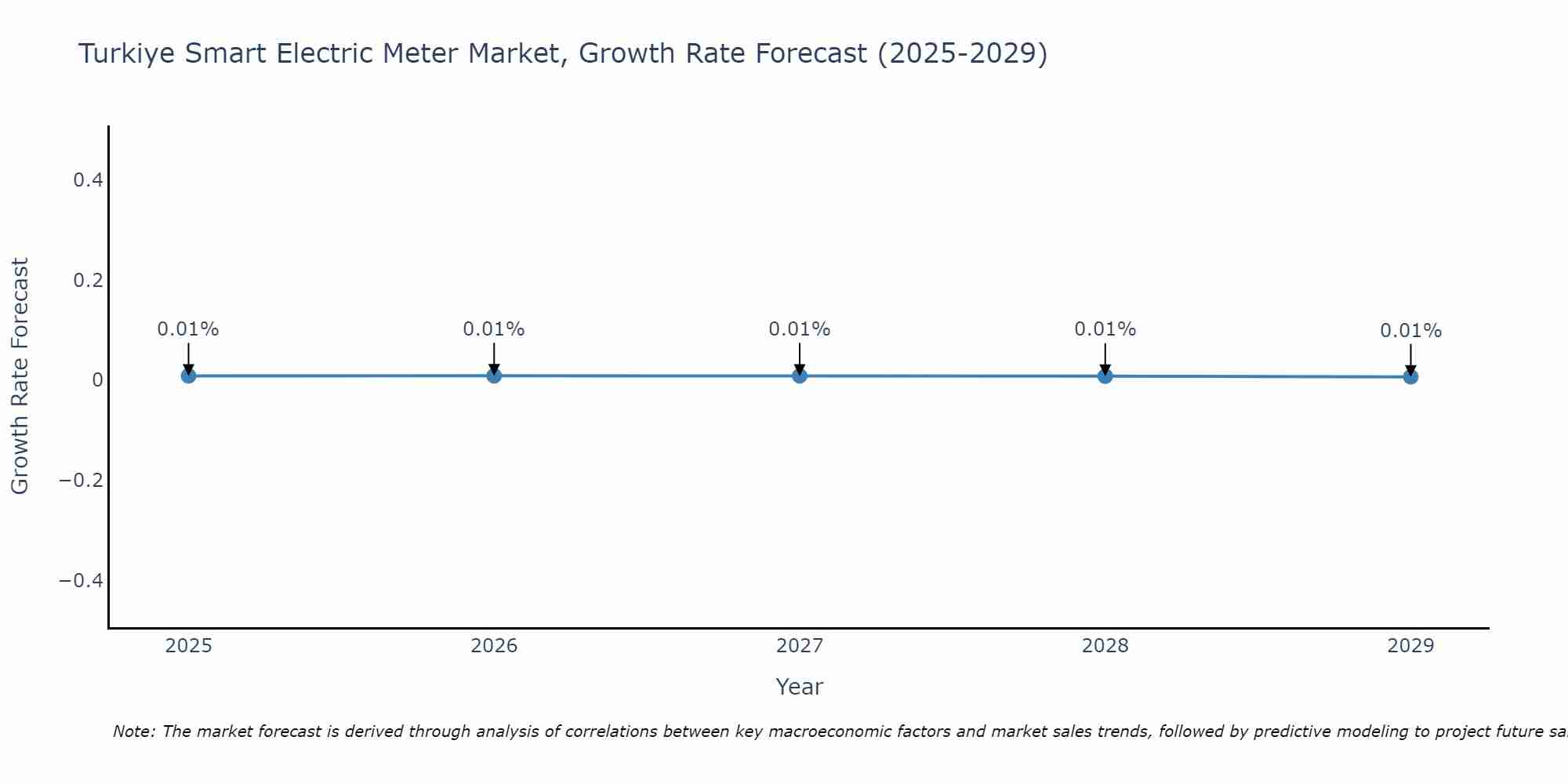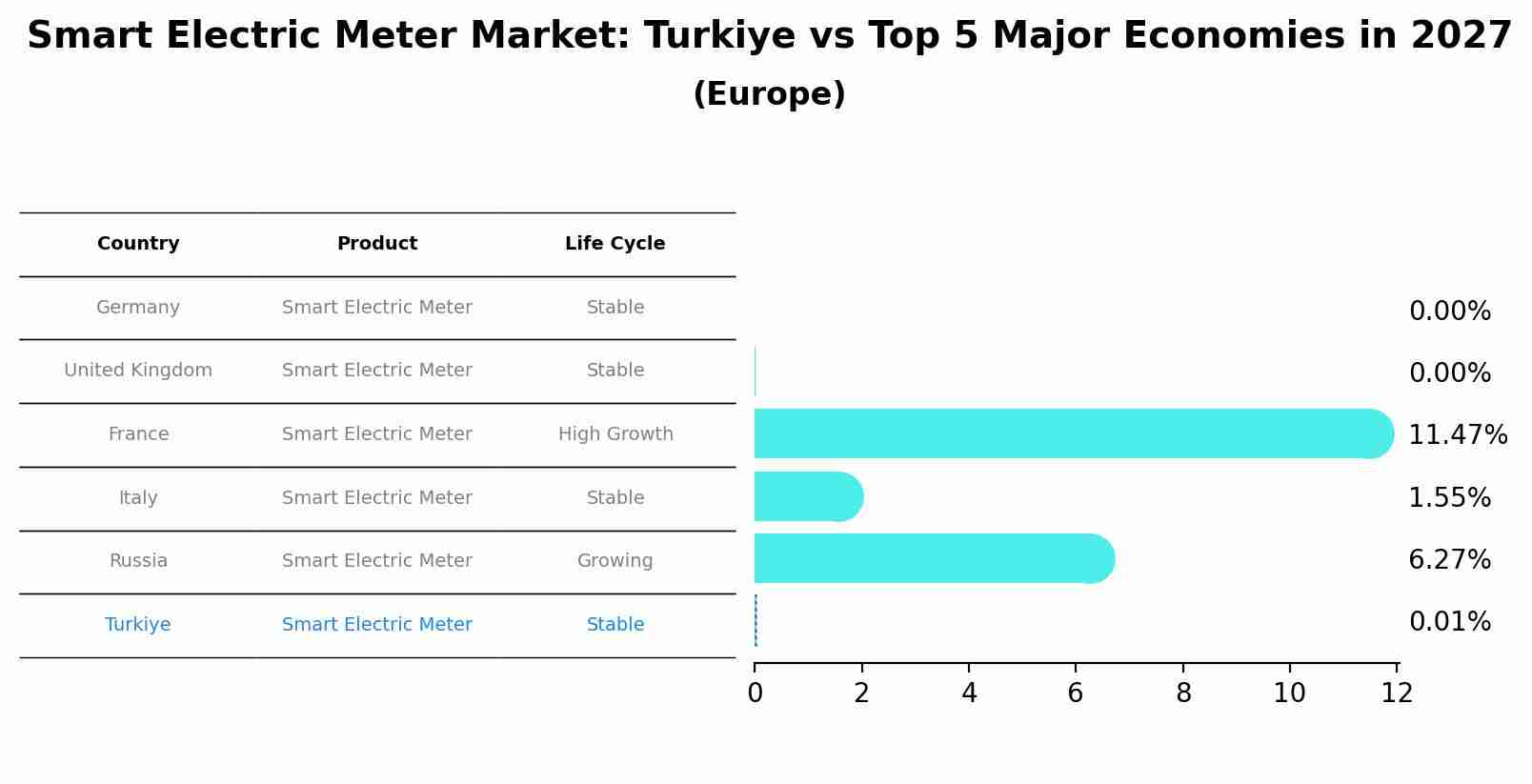Turkey Smart Electric Meter Market Outlook | Value, Analysis, Trends, Companies, Industry, Size, COVID-19 IMPACT, Share, Forecast, Growth & Revenue
| Product Code: ETC369338 | Publication Date: Aug 2022 | Updated Date: Jul 2025 | Product Type: Market Research Report | |
| Publisher: 6Wresearch | Author: Dhaval Chaurasia | No. of Pages: 75 | No. of Figures: 35 | No. of Tables: 20 |
Turkiye Smart Electric Meter Market Size Growth Rate
The Turkiye Smart Electric Meter Market is projected to witness mixed growth rate patterns during 2025 to 2029. Starting at 0.01% in 2025, the market peaks at 0.01% in 2026, and settles at 0.01% by 2029.

Smart Electric Meter Market: Turkiye vs Top 5 Major Economies in 2027 (Europe)
By 2027, Turkiye's Smart Electric Meter market is forecasted to achieve a stable growth rate of 0.01%, with Germany leading the Europe region, followed by United Kingdom, France, Italy and Russia.

Turkey Smart Electric Meter Market Synopsis
The Turkey Smart Electric Meter Market is experiencing significant growth driven by factors such as government initiatives to modernize the electricity infrastructure, increasing focus on energy efficiency, and the adoption of smart grid technologies. Smart electric meters offer features like real-time data monitoring, remote meter reading, and demand response capabilities, which help utilities and consumers manage energy consumption effectively. Key players in the market are investing in advanced technologies like AMI (Advanced Metering Infrastructure) and IoT (Internet of Things) to enhance metering capabilities. Additionally, rising awareness about the benefits of smart meters in reducing energy costs and carbon emissions is further fueling market growth. The market is expected to continue its upward trajectory as Turkey aims to build a more sustainable and efficient energy ecosystem.
Turkey Smart Electric Meter Market Trends
The Turkey Smart Electric Meter Market is experiencing significant growth driven by increasing investments in smart grid infrastructure and the government`s initiatives to promote energy efficiency. Key trends include the adoption of advanced metering infrastructure (AMI) systems to enable real-time monitoring and control of electricity consumption, the integration of smart meters with IoT technology for data analytics and remote management, and the shift towards digitalization and automation in the energy sector. Additionally, the rising awareness among consumers about the benefits of smart meters in reducing energy costs and enhancing overall energy management is driving the market demand. Overall, the Turkey Smart Electric Meter Market is poised for continued expansion as utilities and consumers alike recognize the advantages of smart meter technology in optimizing energy usage and improving operational efficiency.
Turkey Smart Electric Meter Market Challenges
In the Turkey Smart Electric Meter Market, several challenges are being faced. One major challenge is the high initial cost of implementing smart metering technology, which includes the cost of purchasing and installing the meters, as well as upgrading the existing infrastructure to support the technology. Additionally, issues related to data privacy and security are significant concerns, as smart meters collect detailed information on energy usage that must be protected from potential cyber threats. Furthermore, resistance from consumers, regulatory hurdles, and interoperability issues between different metering systems also pose challenges to the widespread adoption of smart electric meters in Turkey. Overall, addressing these challenges will be crucial in realizing the full potential of smart meter technology in the Turkish market.
Turkey Smart Electric Meter Market Investment Opportunities
The Turkey Smart Electric Meter Market presents lucrative investment opportunities due to the increasing focus on energy efficiency and smart grid technologies in the country. With government initiatives promoting the adoption of smart meters to monitor and optimize electricity consumption, there is a growing demand for advanced metering solutions. Investing in smart electric meter companies operating in Turkey can be promising, as they stand to benefit from the market`s growth potential. Additionally, opportunities exist in providing related services such as data analytics and software solutions to support the integration of smart meters. Investing in research and development of innovative technologies to enhance smart meter functionalities and security features can also be a strategic move in this evolving market landscape.
Jordan Agar Market Government Policies
The Turkish government has implemented several policies to promote the adoption of smart electric meters in the country. The Ministry of Energy and Natural Resources introduced a mandatory smart metering regulation in 2016, requiring all electricity distribution companies to gradually replace conventional meters with smart meters. The government aims to improve energy efficiency, reduce electricity losses, and enable consumers to monitor and manage their energy consumption more effectively. In addition, the Turkish Electricity Transmission Company (TEIAS) has been actively investing in smart grid infrastructure to support the integration of smart meters. These policies have created a favorable regulatory environment for the growth of the smart electric meter market in Turkey, attracting investments from both domestic and international players.
Turkey Smart Electric Meter Market Future Outlook
The Turkey Smart Electric Meter Market is poised for significant growth in the coming years, driven by increasing government initiatives to promote energy efficiency and smart grid infrastructure. The adoption of smart meters is expected to accelerate as the country aims to modernize its electricity infrastructure and reduce energy consumption. Factors such as rising electricity demand, growing awareness about energy conservation, and the need for accurate billing and monitoring systems will further fuel the market`s expansion. Additionally, advancements in technology, such as IoT integration and data analytics capabilities, will enhance the functionalities of smart meters, making them more attractive to consumers and utilities alike. Overall, the Turkey Smart Electric Meter Market is projected to experience robust growth and innovation in the foreseeable future.
Key Highlights of the Report:
- Turkey Smart Electric Meter Market Outlook
- Market Size of Turkey Smart Electric Meter Market, 2021
- Forecast of Turkey Smart Electric Meter Market, 2031
- Historical Data and Forecast of Turkey Smart Electric Meter Revenues & Volume for the Period 2018 - 2031
- Turkey Smart Electric Meter Market Trend Evolution
- Turkey Smart Electric Meter Market Drivers and Challenges
- Turkey Smart Electric Meter Price Trends
- Turkey Smart Electric Meter Porter's Five Forces
- Turkey Smart Electric Meter Industry Life Cycle
- Historical Data and Forecast of Turkey Smart Electric Meter Market Revenues & Volume By Phase for the Period 2018 - 2031
- Historical Data and Forecast of Turkey Smart Electric Meter Market Revenues & Volume By Single for the Period 2018 - 2031
- Historical Data and Forecast of Turkey Smart Electric Meter Market Revenues & Volume By Three for the Period 2018 - 2031
- Historical Data and Forecast of Turkey Smart Electric Meter Market Revenues & Volume By Communication Technology Type for the Period 2018 - 2031
- Historical Data and Forecast of Turkey Smart Electric Meter Market Revenues & Volume By Power Line Communication (PLC) for the Period 2018 - 2031
- Historical Data and Forecast of Turkey Smart Electric Meter Market Revenues & Volume By Radio Frequency (RF) for the Period 2018 - 2031
- Historical Data and Forecast of Turkey Smart Electric Meter Market Revenues & Volume By Cellular for the Period 2018 - 2031
- Historical Data and Forecast of Turkey Smart Electric Meter Market Revenues & Volume By End-Users for the Period 2018 - 2031
- Historical Data and Forecast of Turkey Smart Electric Meter Market Revenues & Volume By Industrial for the Period 2018 - 2031
- Historical Data and Forecast of Turkey Smart Electric Meter Market Revenues & Volume By Commercial for the Period 2018 - 2031
- Historical Data and Forecast of Turkey Smart Electric Meter Market Revenues & Volume By Residential for the Period 2018 - 2031
- Turkey Smart Electric Meter Import Export Trade Statistics
- Market Opportunity Assessment By Phase
- Market Opportunity Assessment By Communication Technology Type
- Market Opportunity Assessment By End-Users
- Turkey Smart Electric Meter Top Companies Market Share
- Turkey Smart Electric Meter Competitive Benchmarking By Technical and Operational Parameters
- Turkey Smart Electric Meter Company Profiles
- Turkey Smart Electric Meter Key Strategic Recommendations
Frequently Asked Questions About the Market Study (FAQs):
- Single User License$ 1,995
- Department License$ 2,400
- Site License$ 3,120
- Global License$ 3,795
Search
Thought Leadership and Analyst Meet
Our Clients
Related Reports
- Germany Breakfast Food Market (2026-2032) | Industry, Share, Growth, Size, Companies, Value, Analysis, Revenue, Trends, Forecast & Outlook
- Australia Briquette Market (2025-2031) | Growth, Size, Revenue, Forecast, Analysis, Trends, Value, Share, Industry & Companies
- Vietnam System Integrator Market (2025-2031) | Size, Companies, Analysis, Industry, Value, Forecast, Growth, Trends, Revenue & Share
- ASEAN and Thailand Brain Health Supplements Market (2025-2031) | Strategy, Consumer Insights, Analysis, Investment Trends, Opportunities, Growth, Size, Share, Industry, Revenue, Segments, Value, Segmentation, Supply, Forecast, Restraints, Outlook, Competition, Drivers, Trends, Demand, Pricing Analysis, Competitive, Strategic Insights, Companies, Challenges
- ASEAN Bearings Market (2025-2031) | Strategy, Consumer Insights, Analysis, Investment Trends, Opportunities, Growth, Size, Share, Industry, Revenue, Segments, Value, Segmentation, Supply, Forecast, Restraints, Outlook, Competition, Drivers, Trends, Demand, Pricing Analysis, Competitive, Strategic Insights, Companies, Challenges
- Europe Flooring Market (2025-2031) | Outlook, Share, Industry, Trends, Forecast, Companies, Revenue, Size, Analysis, Growth & Value
- Saudi Arabia Manlift Market (2025-2031) | Outlook, Size, Growth, Trends, Companies, Industry, Revenue, Value, Share, Forecast & Analysis
- Uganda Excavator, Crane, and Wheel Loaders Market (2025-2031) | Strategy, Consumer Insights, Analysis, Investment Trends, Opportunities, Growth, Size, Share, Industry, Revenue, Segments, Value, Segmentation, Supply, Forecast, Restraints, Outlook, Competition, Drivers, Trends, Demand, Pricing Analysis, Competitive, Strategic Insights, Companies, Challenges
- Rwanda Excavator, Crane, and Wheel Loaders Market (2025-2031) | Strategy, Consumer Insights, Analysis, Investment Trends, Opportunities, Growth, Size, Share, Industry, Revenue, Segments, Value, Segmentation, Supply, Forecast, Restraints, Outlook, Competition, Drivers, Trends, Demand, Pricing Analysis, Competitive, Strategic Insights, Companies, Challenges
- Kenya Excavator, Crane, and Wheel Loaders Market (2025-2031) | Strategy, Consumer Insights, Analysis, Investment Trends, Opportunities, Growth, Size, Share, Industry, Revenue, Segments, Value, Segmentation, Supply, Forecast, Restraints, Outlook, Competition, Drivers, Trends, Demand, Pricing Analysis, Competitive, Strategic Insights, Companies, Challenges
Industry Events and Analyst Meet
Whitepaper
- Middle East & Africa Commercial Security Market Click here to view more.
- Middle East & Africa Fire Safety Systems & Equipment Market Click here to view more.
- GCC Drone Market Click here to view more.
- Middle East Lighting Fixture Market Click here to view more.
- GCC Physical & Perimeter Security Market Click here to view more.
6WResearch In News
- Doha a strategic location for EV manufacturing hub: IPA Qatar
- Demand for luxury TVs surging in the GCC, says Samsung
- Empowering Growth: The Thriving Journey of Bangladesh’s Cable Industry
- Demand for luxury TVs surging in the GCC, says Samsung
- Video call with a traditional healer? Once unthinkable, it’s now common in South Africa
- Intelligent Buildings To Smooth GCC’s Path To Net Zero


















